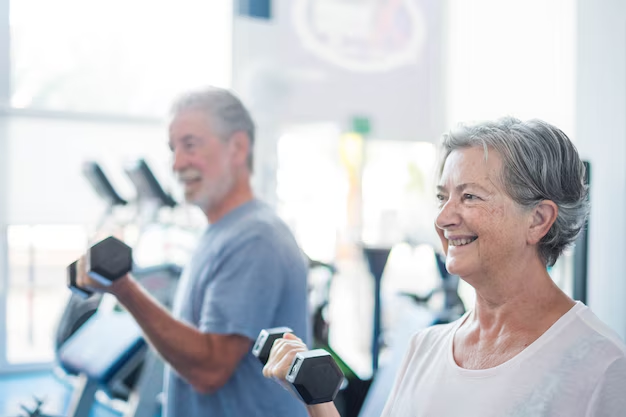Unlocking the Benefits of Fitness Programs Designed for Seniors
Staying active is vital at every age, but as we grow older, our bodies require a more tailored approach to exercise. Senior-specific fitness programs are gaining popularity as they offer a safe, effective way to maintain health and vitality. Whether you’re eager to improve your balance, boost your energy, or just keep moving pain-free, joining a senior exercise program can be a game-changer. This guide will explore their benefits, how they are structured, and what you can expect to gain along the way.
Why Tailored Programs Matter
Ensuring Safety and Effectiveness
Older adults often deal with unique health concerns, such as arthritis, osteoporosis, and heart conditions. Tailored fitness programs consider these issues, adapting exercises to minimize risks while maximizing benefits. This personalized approach emphasizes safety, focusing on exercises that support joint health and cardiovascular strength.
Promoting Longevity and Quality of Life
Regular physical activity is linked to longer, healthier lives. Engaging in structured fitness activities can enhance mental well-being, prevent age-related health issues, and improve overall life satisfaction. These programs often combine resistance training, stretching, balance exercises, and low-impact aerobic activities to create a comprehensive routine suitable for seniors.
Components of Senior-Specific Fitness Programs
1. Strength Training
Building Muscle Without Strain
Strength training is crucial as we age. It not only helps preserve muscle mass but also strengthens bones and improves metabolic health. Senior fitness programs typically use light weights, resistance bands, or even body-weight exercises to enhance muscular strength safely.
2. Flexibility and Balance
Preventing Falls and Increasing Mobility
Falls are a leading cause of injury in older adults. Incorporating balance exercises and stretching into routines helps maintain agility and flexibility, reducing the risk of falls. Yoga and Tai Chi are popular options that combine balance and flexibility work.
3. Cardiovascular Workouts
Boosting Heart Health
Heart health is paramount, and cardiovascular exercises like walking, swimming, or cycling on a stationary bike increase heart rate in a controlled and low-impact manner. These activities improve endurance, support weight management, and enhance overall heart function.
4. Mind-Body Connection
Enhancing Mental Well-being
Exercises that incorporate mindfulness, such as yoga or meditation, are beneficial in managing stress and improving cognitive function. Senior programs often feature components that focus on breathing techniques and body awareness, fostering a deeper mind-body connection.
Choosing the Right Program
What to Consider
- Personal Health Conditions: Understand your specific health needs and look for programs tailored to address them.
- Preferred Activity Level: Choose a program that fits your energy levels and encourages gradual progress.
- Instructor Qualifications: Certified instructors with experience in senior fitness can ensure safety and proper guidance.
- Community and Support: Many programs offer group settings that provide social interaction and mutual encouragement.
Where to Look
Senior centers, gyms, and community health organizations often offer senior-specific fitness classes. Some health insurance plans may even cover enrollment, so it's worth exploring options available in your area.
The Role of Technology
Fitness Apps and Online Classes
For those who prefer exercising at home, technology offers a wealth of options. Many apps and online platforms now provide fitness routines specifically designed for seniors. They offer guided video workouts that you can pause and replay, ensuring you exercise at your own pace.
Wearable Devices
Fitness trackers and wearable technology can help seniors monitor their activity levels and track progress. They offer motivation through reminders and goals, helping maintain consistent exercise habits.
Addressing Common Concerns
Overcoming Fear and Resistance
For many, starting a new fitness routine can be daunting. It's essential to ease into exercise gradually and focus on the benefits, like improved energy levels and mobility.
Adapting to Physical Limitations
Programs often provide modifications for various fitness levels, ensuring everyone, regardless of physical ability, can participate and benefit. The key is listening to your body and avoiding pushing beyond comfortable limits.
Summary of Key Takeaways
🌟 Safety First: Senior programs focus on safety, with exercises tailored to reduce injury risks.
💪 Strength and Balance: Incorporating strength and balance exercises promotes independence.
💓 Heart Health: Cardiovascular workouts support heart function and endurance.
🧘 Mind-Body Connection: Mindfulness and flexibility exercises improve mental and physical well-being.
🔍 Choice and Access: Evaluate health needs and preferences to find suitable programs locally or online.
Building Your Routine
Setting Goals
Start small with clear, achievable goals. Whether it's walking 30 minutes a day or joining a weekly Tai Chi class, setting incremental goals keeps you motivated and fosters a sense of accomplishment.
Staying Consistent
Routine is key. Try to make exercise a daily habit, treating it as a non-negotiable appointment. This regularity helps make fitness an integral part of your lifestyle.
Involving Friends and Family
Making fitness a social activity increases motivation and enjoyment. Involving friends or family in your fitness journey can create lasting bonds and shared health goals.
Empowerment Through Movement
Unlocking the potential of senior-specific fitness programs means embracing an approach that harmonizes body, mind, and spirit. These programs offer an accessible path to improved health, promoting a lifestyle that supports longevity and happiness. Whether through group classes or personal routines, the journey towards active living in later years is only one step away. Prioritize your health by exploring the fitness options available to you, and discover how moving more can mean living more meaningfully.

Related Topics
- A Comprehensive Guide For Seniors: Embracing Creativity Through Art And Craft Classes
- A Comprehensive Guide To Estate Planning Services For Seniors
- A Comprehensive Guide To Home Security Systems For Seniors
- A Comprehensive Guide To Nutritional Counseling For Seniors
- A Comprehensive Guide To Recreational Activities In Senior Centers
- A Nourishing Guide To Liquid Nutrition Supplements For Seniors
- A Resourceful Guide To Senior-Friendly Meal Plans
- An Expansive Guide To Home Modification Services For Seniors: Starting With Grab Bars And Beyond
- An Informative Guide: Captioned Telephones For The Hard-of-Hearing
- Boosting Your Brainpower: Engaging Activities To Enhance Cognitive Function In Seniors
